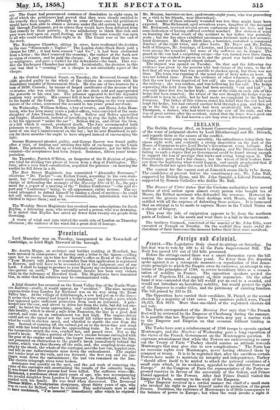Vrottintial.
Lord Macaulay was on, Tuesday, inaugurated in the Town-hall of Cambridge, as Lord High Steward of the borough.
Mr. Austin Maggs, an architect and builder residing at Hereford, has beeh arrested in consequence of having sent a letter to the Queen—calling upon her to render up to him her Majesty's office as Head of the Church. " Your Majesty will please to remember at this application is registered in Heaven, and will have to be accounted for at the judgment seat of our Lord. I shall be happy to produce to your Majesty my credentials as Christ's vice-gerent on earth." The unfortunate lunatic has been very violent while in the infirmary of Hereford Gaol. The Magistrates have remanded him, in order that his relatives may be communicated with.
A fatal disaster has occurred on the Trent Valley line of the North-West- ern Railway—really, it would appear, an " accident." The nine morning express-tram from London for Scotland was on its way along the Trent Valley line. Atthe village of Attleborough, a cow had got on to the line— it seems that the animal had leaped a hedge or passed through a gate, which had appeared quite sufficient protection from such an intrusion. A gate- keeper saw the cow, and strove to drive her from the rails, but did not suc- ceed ; he heard the train approaching, and exhibited a danger-signal. At this locality, which is about a mile from Nuneaton, the line is a good deal carved, and runs on an embankment ten feet high. The engine-driver could not see the signal nor the cow herself till rather near them ; he did what he could to slacken speed, and whistled to startle the cow from the line. Instead of running off, the animal got on to the down-line and stood still with her head turned from the approaching train. In a few seconds the locomotive struck the cow, crushed her, and passed over. Not so the guard's break. While a portion of the cow's carcass became entangled with the gear of the engine and tender, the larger bones remained upon the line, andpresented an obstruction to the guard's break immediately behind the tender, which was thus thrown off the rails, and, the coupling-irons snap- ping by the shock, the whole of the carriages, save the last van, toppled over, and fell in one indiscriminate mass down the embankment. The engine and tender kept on the rails, and ran forward ; the first van and six car- riages went down the embankment ; the last van remained on the line. The electric telegraph wires were broken.
tAssistance was quickly on the spot, and the sad work of removing the ruins of the carriages and ascertaining the results of the calamity began. It was found that three persons had been killed. The sufferers were—Mr. Itylltmond, a gentleman about sixty years of age, who was accompanying his invalid daughter from London to Maryport, in Cumberland, where he resided with his family. He was dead when discovered. The Reverend Thomas Miller, a Presbyterian clergyman, about thirty years of age, who was en route for Belfast, where he resided. This unfortunate man is said to have, exclaimed, "I'm' insured !" immediately after which he expired.
Mr. Morgan, barrister-at-iavr, agedavrenty-eight years, who was proceeding on a visit to his friends, near Shrewsbury. The number of those seriously wounded was less than might have been expected. Miss Richmond, aged seventeen years, daughter of the deceased Mr. Richmond, received several severe contusions about the face, and has some indication of having suffered cerebral mischief. Her distress of mind on learning the fatal result of the accident to her father was painfully acute ; but she has since exhibited uncommon fortitude under her accumu- lated distresses. Mr. Henry Brett Ince, a barrister, sustained a compound fracture of the right wrist, and other hurts. Mr. Bryce and Mr. Dallas, both of Glasgow, Mr. Jennings, of London, and Lieutenant G. E. Corrance, were among the wounded ; but none of the sufferers are in danger. The guard in the van had a surprising escape—the van turned over three times, a carriage was crushed to pieces on it, and the guard was buried under the luggage, and yet he escaped almost unhurt.
The inquest was opened on Tuesday. On that and the following day evidence was given by the persons who had charge of the train, to the ef- fect that all was done that was possible to slacken speed, but there was not time. The train was running at the usual rate of forty miles an hour. It was not behind time. From the evidence of other witnesses, it appeared that the cow had been deprived of her calf ; she was placed in a field next the railway ; she was restless, and was bellowing for her calf. The hedge separating this field from the line had been recently "cut and laid " ; it was only three feet five inches high ; some of the rails on each side of this hedge had been removed; the owner of the cow thought the hedge was in- sufficient to keep in cattle, but he had made no complaint to the Railway Company. The father of this witness stated his belief that the cow had not leapt the hedge, but had entered another field through a gap, and then got on to the line by a gate which had been accidentally left open. Mr. Thompson, a farmer, who had tried to get the cow off the rails, and who was of great service after tho accident, stated that the fence was a good one before it was cut. He had known a cow leap over a five-barred gate.






























 Previous page
Previous page